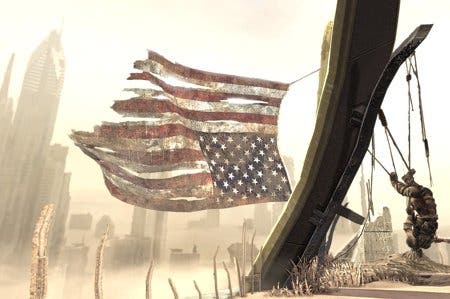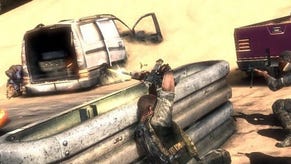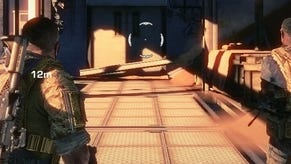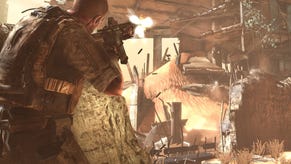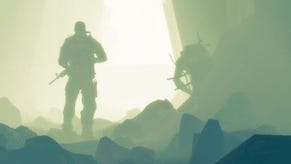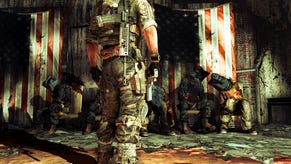Spec Ops: The Line Review
An outpost of progress.
So much of it comes down to a question of influences: Conrad, not Clancy; BioShock, not Call of Duty. At first glance, Spec Ops: The Line looks like so many other military shooters, built of sand dunes and dusty fatigues and filled with the flash and sparkle of a thousand rifles glinting in the sun. Look again, though, and you'll see the setting's quietly fantastical, and the two-man squad under your command seem unusually tense - worn down, twitchy, even a little shell-shocked.
Yager's latest is trying to have it both ways, perhaps - Gears-flavoured stop-and-pop action one minute, The horror, the horror, the next - but the end result is interesting in its internal conflicts, and bold in its willingness to embrace its own confusion. Spec Ops: The Line is a game divided, and that isn't a criticism at all. It's actually the best thing about it.
This isn't the first shooter to draw from Joseph Conrad's novel Heart of Darkness, of course, but compare it to Ubisoft's attempt in the brilliant, uncompromising and frequently infuriating Far Cry 2 and you won't find too many elements in common. Far Cry 2 was a sandbox and Spec Ops is a corridor: it's a cover-based blaster in which you clear rooms of enemies, cast weapons aside to pick up new ones, and occasionally sit back to watch a set-piece unfold.
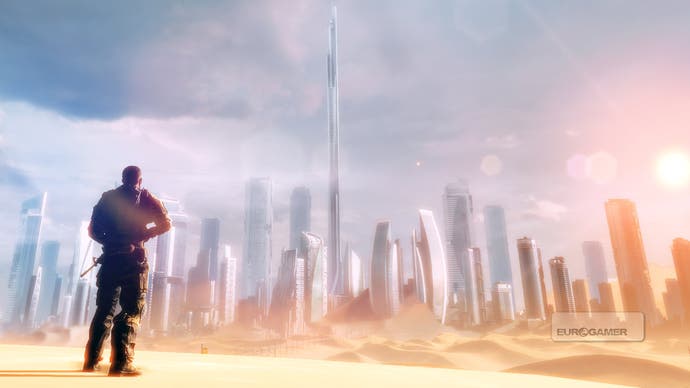
The Marlowe stand-in is Captain Martin Walker: Nolan North with a wrinkle in his brow and the past playing on his mind. North's in everything these days, of course, but that ubiquity actually works in Spec Ops' favour. You're so used to his breezy, knockabout presence that you're gently wrong-footed as his character slowly comes into focus. You're all set for a matinee hero and you don't expect a lead with a little more substance to him.
Walker's the head of a three-man team, and he's been sent to explore Dubai after it's been swallowed by the desert in a series of freak sandstorms. His hero, Colonel John Konrad, was meant to be leading an evacuation, but the storms got worse and he hasn't been heard of for months. Recently, strange radio signals have started crackling out from the centre of this extravagant, battered metropolis. Walker's the first one in afterwards and he discovers that the city has become a weird, crumbling battlefield: a shifting maze filled with wild men and charred corpses.
Dubai's a place where anything could happen, and although the Gears-style shooting gallery can be a little relentless at times, anything often does. As with BioShock, the setting for Spec Ops consistently elevates the action: you're flanking a turret, but you're doing it on the hundredth floor of a ruined skyscraper, with rowing machines and a fancy bar poking out from beneath the sandbags and ammo crates. You're inching forwards through narrow trenches, and then you look up and see the spiral arms of a department store's walkways interlocking overhead.
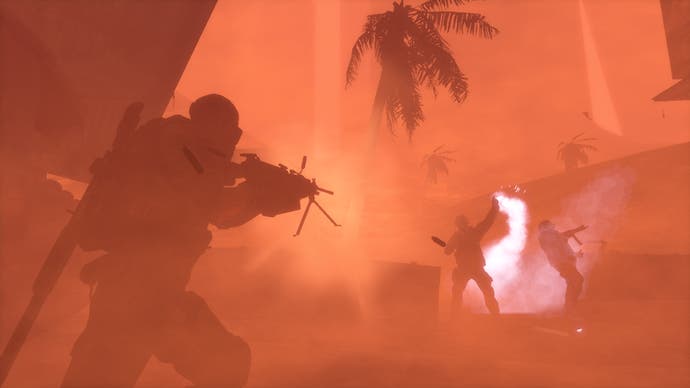
Games love to explore ruined beauty now that there are engines that are so gifted with rebar and rubble, but Spec Ops is something else entirely. The point isn't that Dubai is beautiful, because it isn't, really, when you get down to it. It's opulent, grotesque, and it was insane even before the sands poured in. Although Yager has a tendency towards trite juxtaposition - notice boards filled with posters of missing fathers next to a shop selling ball gowns or jewellery, say - the team offers plenty of moments where the effect is genuinely otherworldly.
You'll execute soldiers by smashing their heads against hotel flooring that is also a huge fish tank, you'll crouch behind sand-stripped Audis and you'll snipe foes while nestled between the legs of a giant lapis-lazuli giraffe. Spec Ops will take you to the world's plushest warzone - and it's definitely a place worth seeing.
You get Coppola as often as Conrad, of course, as the sweaty isolation combines with the absence of authority and the density of military personnel, turning Dubai into something that feels a little like Apocalypse Now's Vietnam. On occasion, the level of homage becomes smothering. There are a few too many fights that erupt beneath the distorting wail of dreamy prog rock, while an operatic helicopter moment suggests only that you're being strafed by the world's most bloodthirsty cineastes.
Although there are stand-out moments when Walker's called upon to make a "choice" - these generally unfold without the use of button prompts, which is entirely laudable, and typically require you to choose between two evils, which is unsatisfying but at least thematically appropriate - the best, most affecting sequences in the game aren't massive set-pieces and aren't epic conflicts between good and evil. They're brief, callous glimpses into the grim chaos of war - even a pared back video game war, built and played by people with little or no experience of the real thing - and they're delivered with the lightest touch and an absence of crash-zooms or lingering pauses. They're the instances when you ponder the fact that the third man out of the five soldiers you just gunned-down didn't actually look or act much like a soldier, or even a man, actually. They're the moments when you glimpse a pile of rags in the distance and - very Conrad, this - realise they probably aren't just rags.
"You'll execute soldiers by smashing their heads against hotel flooring that is also a huge fish tank, you'll crouch behind sand-stripped Audis and you'll snipe foes while nestled between the legs of a giant lapis-lazuli giraffe. Spec Ops will take you to the world's plushest warzone."
It feels like chaos, but it never plays like it. If anything, Spec Ops is a little too slick when it comes to the action that's taking place within this depraved, defeated arena. It's hard to complain too much, though: the usual range of guns and grenades all feel wonderfully nasty and precise, your enemies come with a few interesting variants - the heavy, the shotgunner and, worst of all, the gymnast guy with the knife - and your squad responds to simple commands with a realistic kind of harried efficiency. When they're not offering chit-chat that serves as a barometer for how bad the overall atmosphere has become, you can instruct them to focus fire on specific targets, let off flashbangs or even heal each other. Or you could leave them be, and they'll choose their own shots well enough, taking cover, moving forward and rarely, if ever, jogging mindlessly against a low wall.
As a shooter, Spec Ops is not bad at all. But while the game separates you from your squad, throws you back together and sends you down into exposed streets and up against entire tower block façades riddled with snipers, the ceaseless grind of the battle may start to become tiresome towards the final third of the campaign. However, when the rooms start to blur and one turret section gives way to the next, at least the sand's there to provide a few nice moments.
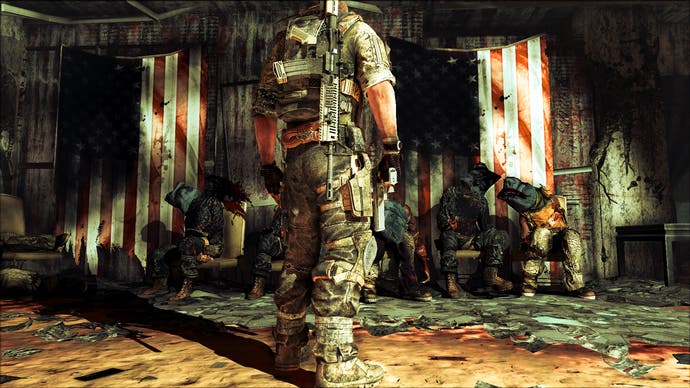
Its use is heavily scripted, but it's handy to be able to shoot out panes of glass or bring down buttresses, burying enemies beneath the impromptu dunes, and there are also visibility-reducing sandstorms rigged to blow through town at certain moments, staining the world red and filling the landscape with ragged shadows. Beyond the main campaign, there's multiplayer too: a familiar though extremely playable muddle of modes, load-outs, levels and perks that gains an awful lot from its smart, booby-trapped maps. And behind it all there's always Dubai, with its tightly-constructed horrors, its skyscraper sparkle and its oppressive, brooding gloom.
Perhaps Spec Ops is ultimately more successful as a place than as a story. The narrative, while delivered with a surprising earnestness, quickly becomes a little tangled in its mix of false choices and real choices as it fumbles its way towards apportioning blame. So it settles, instead, for the easiest option available to a video game, a little light commentary on the nature of fate - and perhaps the contradictions inherent when players interact with scripted linearity, too.
Meanwhile, although the campaign tries to have its COD as well as its Conrad, the two never quite mesh. How could they? It's so much fun to shoot people here, and it's so hard to feel genuinely bad about it afterwards, no matter what horrors a cut-scene unveils. However your own final confrontation plays out, regardless of the micro-decisions you've made along the way, it may well feel stagey and subtly false. And for all the focus on character, Spec Ops finds no true access to Conrad's greatest tool: interiority, revealing the deepest, most abstract thoughts of Marlowe, the connections he makes and the imagery he invokes.
It tries, though. It tries to do something special, and it tries to create something memorable and something strange. In Dubai itself, it genuinely succeeds, perhaps because the reality of the place is already so gaudy, so cloyingly, oppressively weird, that it provides a good hard shove in the right direction before the first bullet's been fired. There are such a lot of shooters these days, and so many tend to blur into each other if you're not careful. This one won't, however - and that's quite an achievement.
